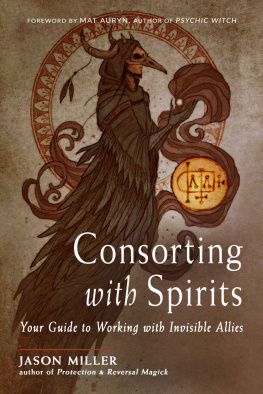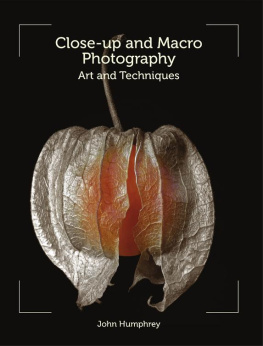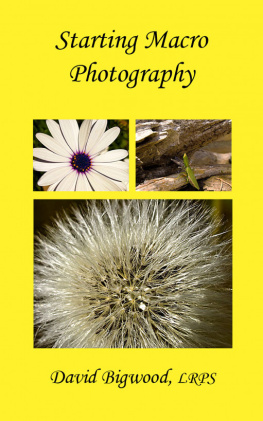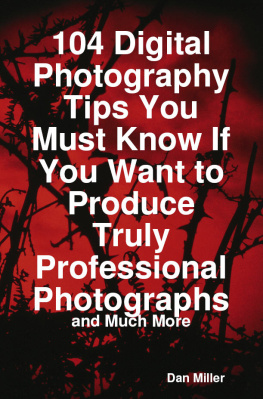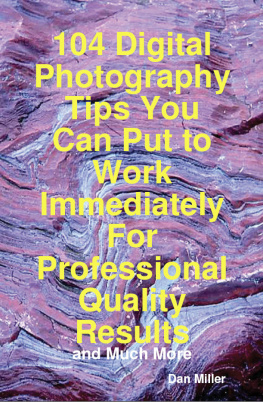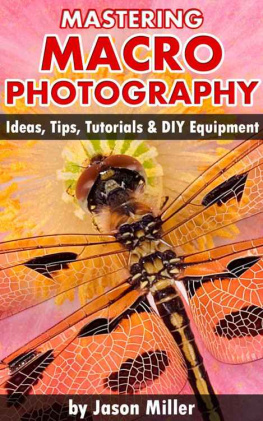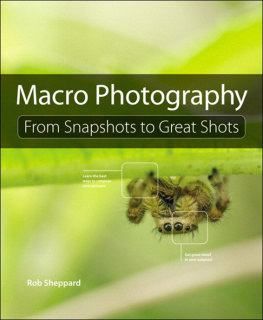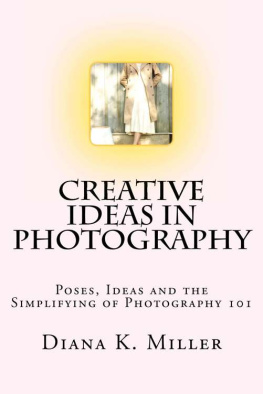Jason Miller - Mastering Macro Photography - Ideas, Tips, Tutorials & DIY Equipment
Here you can read online Jason Miller - Mastering Macro Photography - Ideas, Tips, Tutorials & DIY Equipment full text of the book (entire story) in english for free. Download pdf and epub, get meaning, cover and reviews about this ebook. year: 2014, publisher: Seeing in Macro, genre: Romance novel. Description of the work, (preface) as well as reviews are available. Best literature library LitArk.com created for fans of good reading and offers a wide selection of genres:
Romance novel
Science fiction
Adventure
Detective
Science
History
Home and family
Prose
Art
Politics
Computer
Non-fiction
Religion
Business
Children
Humor
Choose a favorite category and find really read worthwhile books. Enjoy immersion in the world of imagination, feel the emotions of the characters or learn something new for yourself, make an fascinating discovery.

- Book:Mastering Macro Photography - Ideas, Tips, Tutorials & DIY Equipment
- Author:
- Publisher:Seeing in Macro
- Genre:
- Year:2014
- Rating:5 / 5
- Favourites:Add to favourites
- Your mark:
- 100
- 1
- 2
- 3
- 4
- 5
Mastering Macro Photography - Ideas, Tips, Tutorials & DIY Equipment: summary, description and annotation
We offer to read an annotation, description, summary or preface (depends on what the author of the book "Mastering Macro Photography - Ideas, Tips, Tutorials & DIY Equipment" wrote himself). If you haven't found the necessary information about the book — write in the comments, we will try to find it.
Jason Miller: author's other books
Who wrote Mastering Macro Photography - Ideas, Tips, Tutorials & DIY Equipment? Find out the surname, the name of the author of the book and a list of all author's works by series.
Mastering Macro Photography - Ideas, Tips, Tutorials & DIY Equipment — read online for free the complete book (whole text) full work
Below is the text of the book, divided by pages. System saving the place of the last page read, allows you to conveniently read the book "Mastering Macro Photography - Ideas, Tips, Tutorials & DIY Equipment" online for free, without having to search again every time where you left off. Put a bookmark, and you can go to the page where you finished reading at any time.
Font size:
Interval:
Bookmark:
Mastering
Macro Photography
Ideas, Tips, Tutorials & DIY Equipment
Published by:

www.seeinginmacro.com
Copyright 2014. All rights reserve worldwide. No part of this publication may be replicated, redistributed, or given away in any form without the prior written consent of the author / publisher.
Table of Contents
Macro photography is one of the most challenging forms of photography. It opens up a whole new world for photographers to explore and encourages them to see the world with a different perspective. If we had to define macro photography, we would say that it is the art of making small objects look big. It is about bringing out the beauty in the objects that we often take for granted in our daily lives
Whilst the world of macro photography is typically associated to images of insects, flowers and plants, macro photographers are not limited to these subjects only. When you step into the macro photography world, you will soon discover that there is another side to macro photography one that is abstract and creative.
This could involve capturing the exciting textures and patterns of an object and turning the small details of the object into the focus of attention. For example, the texture of a sliced fruit or the patterns on a butterfly wing or even the wrinkles on a person.
Before you start your macro photography journey, we must warn you first macro photography is extremely addictive. You will be locked into a life long journey of learning and you will be constantly honing your photographers eye, patience and perseverance.
So we wish you the best of luck and hope that you will enjoy the journey - it is going to be an exciting and rewarding one!

Image 1 - What is Macro Photography?
Up until now, we have intentionally steered clear of the technical definition of macro photography to avoid putting you to sleep. It is not an interesting topic to cover so we will try to make this as painless as possible for you.
In the macro photography world, you will hear many debates on the differences between macro photography and close up photography. It is a hot topic and more than likely, you will be sucked into this debate at some point in your journey.
It is important to keep in the back of your mind the differences between macro photography and close up photography. These photos may look very similar to you however when we start to drill down into the technical components, they are actually different.
Macro photography generally requires a 1:1 or higher magnification ratio between the object image that you are photographing and the real object. What this means is that if you are photographing a bee that is 1 inch in size, this bee will appear as 1 inch or greater on your cameras sensor. If the object image is smaller than the real object, this will then be categorized as close up photography.
Whether you achieve the magnification ratio of 1:1 or higher is going to be dependent on the photography equipment that you use. We will cover this in a later chapter.
So does it really matter? For us - No. But for some other people - Yes. In this book, we will be using the terms interchangeably. While it is important to know the technical differences between macro photography and close up photography, we believe that it is far more important for a photographer to get out in the field, shoot, learn and enjoy themselves.
So, dont let the macro photography or close up photography debates confuse you or stop you from entering the macro photography world.

Image 2 - Macro Photography vs Close-Up
Many people do not fully understand what magnification ratio means and more than often, it can be quite confusing as well. So to make sure you have a good grasp of it, we wanted to cover magnification ratio in a little more detail and then teach you a simple method to determine the magnification ratio of your own equipment. Itll be quick, easy and fun.
Macro photographers are always keen to know what magnification ratio that they are achieving with their equipment because a higher magnification ratio will ultimately allow them to obtain closer photos of their photography subjects. More importantly, after learning about the way to calculate your magnification ratio, you will then be able to speak to other macro photographers and tell them about the magnification ratio of your equipment!
So what does a magnification ratio of 1:1 mean? To re-cap what we said previously, this basically means that when you take a photo of a butterfly, the projected image of the butterfly on the cameras sensor will be the actual size of the butterfly.
To help us understand this, lets associate some numbers to the examples. Let us assume that the cameras sensor is 26mm in length. When 26mm of the actual image is projected onto the cameras 26mm sensor, then this results in a magnification ratio of 1:1. When 52mm of the actual image is squeezed in to fit onto the cameras 26mm sensor, then this results in a magnification ratio of 1:2. This means that your actual image size/magnification has been reduced to half. When 13mm of the actual image is projected onto the cameras 26mm sensor, then this results in a magnification ratio of 2:1. This ultimately means that your actual image has doubled in size.
There are a number of different ways to calculate your magnification ratio. Some people will suggest using a simple math formula to calculate the magnification ratio. However, you need to be aware that the formula have its limitations and do not always work for every type of macro photography equipment setup. The math formula method has confused many people in the past and as such we have chosen not to cover this method in this book.
Instead, we are sharing this hands-on method of calculating your magnification ratio for your macro photography setup. It will work for every simple or complex macro gear setup you have. It is extremely fun and you can really see and measure the magnification change right in front of your eyes!
- Camera
- Ruler
- Length size of your cameras sensor (You can easily obtain this from the manufacturers website or just Google your camera model + sensor size. eg. Nikon D80 sensor size)
- Lay your ruler on a flat surface and have your camera vertically above it.
- Aim at the ruler and try to locate the closest height where you can still focus onto the ruler. You will need to move your camera closer to the ruler while trying to focus onto the ruler. There will be a point where you will just not be able to focus on the ruler anymore. You want to locate the point right before that happens.
- When you have located the last point where the ruler is still in focus, take a photo of the measurement on the ruler.
- Look at your photo and count how many millimeter (mm) of the ruler is contained within the photo
- Compare that measurement to the length size of your cameras sensor. For example, the sensor size on the manufacturers website may be 37mm (length) x 24mm (width) and the photo of the ruler shows approximately 37mm in length. This means that you have 1:1 magnification ratio (life size). If the photo of the ruler shows approximately 18.5mm, then you have 2:1 magnification ratio (twice the life size).
Font size:
Interval:
Bookmark:
Similar books «Mastering Macro Photography - Ideas, Tips, Tutorials & DIY Equipment»
Look at similar books to Mastering Macro Photography - Ideas, Tips, Tutorials & DIY Equipment. We have selected literature similar in name and meaning in the hope of providing readers with more options to find new, interesting, not yet read works.
Discussion, reviews of the book Mastering Macro Photography - Ideas, Tips, Tutorials & DIY Equipment and just readers' own opinions. Leave your comments, write what you think about the work, its meaning or the main characters. Specify what exactly you liked and what you didn't like, and why you think so.

